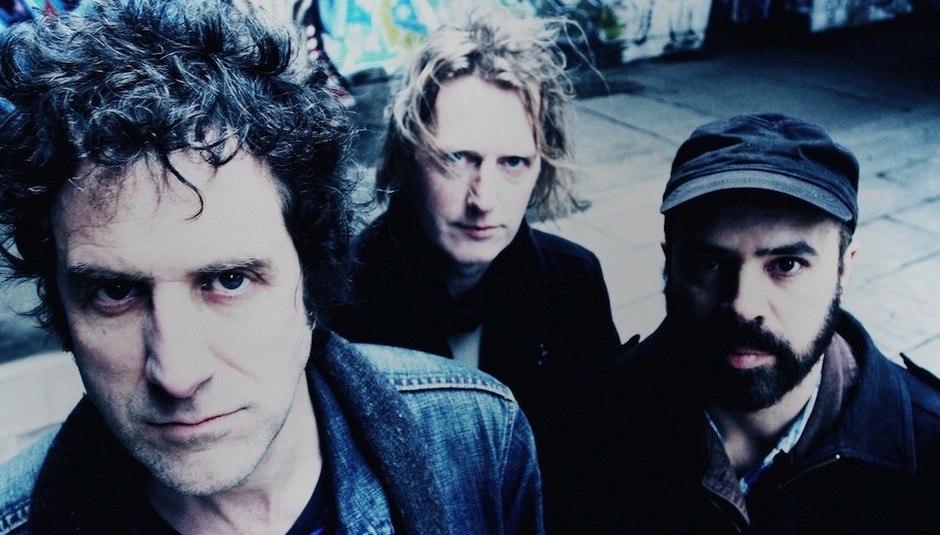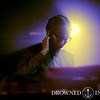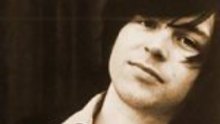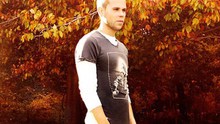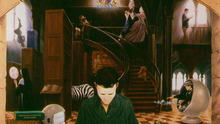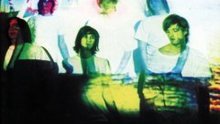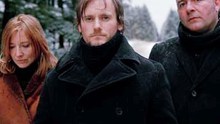After a seventeen year wait, Swervedriver finally released their fifth long player I Wasn't Born To Lose You in March. This month sees the band embark on their biggest UK tour since reforming and DiS caught up with the two remaining original members Adam Franklin (vocals, guitars) and Jimmy Hartridge (guitars) prior to their recent show at Nottingham's Bodega.
DiS: This is your first full UK tour in two decades. What's it been like playing intimate venues again? Does it feel any different to when you first started out?
Adam Franklin: Surprisingly not. You'd think it would change enormously after twenty years but it hasn't.
Jimmy Hartridge: Time has passed so fast. It seems like nothing has really changed at all. We're still playing a lot of the same songs to a lot of the same people. It's crazy really. It should be like a completely different terrain.
DiS: There's an increased demand for new bands to tour constantly in order to survive. Do you think Swervedriver would cope with those demands if you were a new band just starting out?
Adam Franklin: I think we did that anyway. We went out on some pretty long tours back then.
Jimmy Hartridge: We could have scaled it right down with this tour. That's what we did last time where we only played Manchester and London. This time we decided to go to a few more places. We drove past Stroud earlier. I don't think we ever played there but I remember loads of bands playing there back in the day. Apparently it was a great place to play because the audience were always really receptive.
DiS: You tend to find that a lot of backwater towns like Stroud often throw up some of the most memorable gigs because the audiences are up for it more as they don't get to see that many touring bands.
Adam Franklin: Definitely. I remember some of our best shows being at Tunbridge Wells Forum, which was the archetypal toilet venue. Literally in fact, as it was an old converted urinal block!
Jimmy Hartridge: Status Quo tend to do it all the time. If you look at their tour dates they'll regularly go to places like Folkestone and Wrexham which aren't necessarily on the traditional circuit.
Adam Franklin: The last time we toured before we broke up we went on the road with a band called Powderfinger and covered a lot more ground.
DiS: The last time I saw Swervedriver play was at Reverence Festival in Portugal last year, which mainly featured a lot of psych rock bands. What do you make of the growing popularity of the psych scene and where do Swervedriver fit into it?
Jimmy Hartridge: I don't think we do fit into it.
Adam Franklin: There seems to be a psych fest popping up in every town. I think a lot of bands attached to that scene aren't really psychedelic. They're just recycling old Spacemen 3 riffs which have already been through a 13th Floor Elevators filter. You want genuine creativity really. There are some bands that are pushing boundaries, but as with any scene, a lot that aren't as well. Still, I suppose it's better than having a New Romantic revival or something!
Jimmy Hartridge: A lot of it is very bog standard and not really psychedelic at all. It's more like tranquiliser rock!
DiS: Swervedriver have been cited as an influence for a lot of new bands over the past few years. Has that been reflected in the demographic of the audiences at your shows? Is there a new generation of live followers alongside the hardcore who saw you first time around?
Adam Franklin: That's definitely been the case. When we played Coachella you could see people who were there from back in the day stood alongside kids in their early twenties. It's good that we're not just seen as a nostalgia act. I'd hate to be one of those bands touring as part of an 80s or 90s package. If it ever came to that then maybe we would stop.
Jimmy Hartridge: That's one of the reasons we're focusing on the new album with the live set. That way it's difficult to accuse us of being a nostalgia act. And even when we do play some of the older songs it actually feels like this is happening now rather than twenty years ago or whatever. There are kids out there who've never seen us before, so in a way everything we play is new to them.
Adam Franklin: I wouldn't want Swervedriver to become a legacy act. I hate that term. When we played New York earlier this year, the show sold out straight away so we added a second night and that sold out too. We added a third night and thought it best we do something different so we played the new album in its entirety from start to finish without even announcing it beforehand. We just walked on stage, said we would be playing the new album, played it and people didn't leave.
Jimmy Hartridge: A lot of people think this new album is our best anyway. I know I do.
DiS: Swervedriver's sound has continually evolved over the years with every record. While Adam's vocal remains distinctive, there's a genuine musical change on each album. Is that something you consciously strive for?
Adam Franklin: We were always tagged as a shoegaze band but I don't think we had anything in common with any of them really.
Jimmy Hartridge: Apart from being on Creation Records and coming from Oxford. Every band that emerged from the Thames Valley in the early 1990s was called shoegaze at one point.
Adam Franklin: Going back to the original question, our main aim on this album was to consolidate the band's sound. We've always had to do that from Raise onwards. I remember talking to our old bass player Adi Vines about what we'd do with the second album. We were thinking of reinventing ourselves but then he left and our original drummer Graham Bonnar left as well, so we thought maybe it would be best to come back with something fairly recognisable as us after all. Ejector Seat Reservation was probably the record where we did take a step back. There was certainly less of an American influence and drum sound on that album than the others. It had more of a lo-fi sound. But then that album didn't get released in the US so by the time we got around to making 99th Dream it felt like we were trying to consolidate again. 99th Dream is quite similar to Ejector Seat Reservation in many ways. I think the new record is more of a continuation of where we were then, even though there's a seventeen year gap between albums. Whether it would have sounded the same had we continued to make new records throughout the early 2000s is difficult to say. But at the same time it would have been pointless for us to have come back with something that's completely out there. It was important that it sounded like a Swervedriver record.
DiS: While Raise and Mezcal Head are both rightly held in high regard, both Ejector Seat Reservation and 99th Dream_ seem to have been somewhat overlooked. Do you think Britpop played a part in that?
Adam Franklin: Without a doubt. It was a double whammy really because over here you had Britpop, and then A&M didn't release Ejector Seat Reservation in the States. Geffen wanted to sign us but when A&M caught wind of it they asked for a ridiculous amount of money. And because Creation were making a lot of money from our A&M deal they couldn't afford to keep us on for the next album because we weren't selling enough records. So we ended up being stuck between a rock and a hard place. That's when we first went to Australia and round Europe which seemed like something new happening at that time.
Jimmy Hartridge: We definitely got buried under Britpop. Not just by the media but also Creation Records because Oasis had just broken through. For every pound we made on record sales they made a million with Oasis. You can't blame them really. How much money would you give to a band that isn't really making anything?
DiS: I agree with that to a degree, but on the other hand maybe Creation could have reinvested some of that Oasis money into bands who'd been the lifeblood of the label from the outset.
Jimmy Hartridge: If they'd been more long sighted I guess that could have happened, but then people just got so busy.
Adam Franklin: The office changed overnight. Creation were literally swamped under Britpop. They had to bring loads more people on board just to deal with Oasis. Suddenly there were people in the office we didn't know, whereas early on it felt like one big happy family. Just (Alan) McGee and a load of Scots!
Jimmy Hartridge: I guess it all became about numbers and ours didn't really add up.
DiS: After 99th Dream came out in 1998, the band went away for the best part of a decade. What influenced you to get back together?
Jimmy Hartridge: I don't really know to be honest. It seemed for a while that we would never get back together.
Adam Franklin: A couple of years went by and nothing really happened, but then things started springing up online where people were just discovering the band and asking if we'd actually split. So we all started talking about it and everyone was coming round to the idea. Then one day I was at home in New Jersey and Jimmy called to say, "Everyone's here, we're getting the band back together!" There was never really a conscious split anyway. We decided to take a three month break that turned into six months then ended up moving to different parts of the world and became involved with other projects.
DiS: You're the only two original members in the current line-up. Did you consider reforming the first incarnation of the band, particularly for the Raise shows?
Adam Franklin: No. Steve (George) has been the bass player since 1993. He's played on every record bar the first one. I don't think Adi (Vines, original bass player) wanted to be in it anyway. We still see him around. He's a guitar tech and works with lots of touring bands all over the world. I often meet up with him at gigs and stuff like that. He's a great guy. He used to work with Ash and I went to see them with him. After the show I remember him saying to me being in a band is a mug's game.
Jimmy Hartridge: He'd rather be on that side of the stage than actually on it. There's more money and security in what he does for a start.
Adam Franklin: He's worked with some legendary guitarists. When the Sex Pistols played Brixton Academy a few years ago he was Steve Jones guitar tech. I think that's probably his proudest moment in rock.
Jimmy Hartridge: He doesn't want to step back into playing in a band.
Adam Franklin: I remember me and him chatting to John Peel before we went on stage at Reading Festival in 1991. Adi told him he used to be a roadie, so when we went on, John Peel announced us as being four ex-roadies that formed a band!
Jimmy Hartridge: We did get Graham (Bonnar, original drummer) back in the band for a while. We bumped into him a lot at gigs and stuff and he was always up for it. He called me up in the early 2000s about getting back together but nothing really happened. So when we did get back together Jez (Hindmarsh) rejoined the band, but when he left in 2010 Graham came back on board. He did a couple of tours around Australia and Scandinavia then went on his way again.
DiS: You're all based in different parts of the world. Does that create any problems when it comes to writing, recording and particularly rehearsing?
Adam Franklin: It doesn't create too many problems because we can share files on the internet. Our drummer's from New York so we flew him over for a week before we did the album. He flew back as soon as he'd laid his drum parts down.
Jimmy Hartridge: It actually makes things easier in some respects. As long as we can get together for a week to rehearse before a tour there shouldn't really be a problem. Even back in the day I remember Pavement being from different parts of the States. Some lived in New York and some in California, and I thought at the time how on earth is that going to work. But it did, and I guess now it's quite common. I mean, look at the Brian Jonestown Massacre for example. They're spread across several continents.
DiS: How many songs did you rehearse for this tour? Are there any songs in your back catalogue that you've deliberately left out this time around?
Adam Franklin: There's a few off the first album we've left out because I think it's been overplayed recently. Even though we hadn't played a lot of those songs for years before the Raise shows, I soon got sick of some of them. I wouldn't say we'll never play them again, but for now we'd rather concentrate on the new album.
Jimmy Hartridge: Then there's the added thing of Mikey (Jones, drummer) who only joined the band in 2011 and Mick Quinn from Supergrass who's playing bass on this tour not knowing all of our back catalogue. We can only give them so much to learn. It would be impossible to expect them to master five albums in such a short space of time.
Adam Franklin: Mick's an old buddy from back in the day. I used to play with his brother in my very first band. It was also the first time I played an electric guitar plugged in. 'Silver Machine' by Hawkwind was the riff I would play!
Jimmy Hartridge: The setlist has been pretty rigid on this tour which I'm actually quite enjoying. We used to mix it up every single night which is also great but I'm enjoying having a bit of stability every night too!
DiS: Having played the Raise album in full, will you be doing anything similar for any of your other albums?
Adam Franklin: Maybe. I think it's an interesting concept playing an album from start to finish. Before the Raise shows we'd never actually played the last song on the record ('Lead Me Where You Dare') before. Then there's the little jam me and Graham did on the record before 'Sandblasted', so we had to include that in the set as well. The album has certain peaks and troughs so therefore the performance does as well. We were actually recording the new album in between performing Raise. I remember having a day off in Melbourne so we spent it in the studio. It really worked for us in terms of raising our adrenalin for the new album. Then we recorded the other five in Konk, which is Ray Davies' studio when we were playing Raise in London a couple of years ago.
DiS: How long did it take to write the album up to that point? 'Deep Wound' came out as a single in the latter part of 2013. Do any of the songs on the record date back even further?
Adam Franklin: No. 'Deep Wound' is the oldest song on the album. We had a few false starts before 'Deep Wound' came along. We'd been knocking ideas back and forth for just over a year. Fortunately, when we sat down to go through which ten songs to include on the record we all agreed on the same ten songs. So that became the album and the recording happened very quickly. The drums and bass were done in a day while we were in Melbourne. Then the rest was finished over two days at Konk.
Jimmy Hartridge: So the whole thing took just three days, which is pretty incredible.
Adam Franklin: Then I went to Oxford and did the vocals at Mark Gardener's place (OX4). It was great working with another singer. He gave me some of his herbal tea which helped my voice massively.
Jimmy Hartridge: The mixing took quite a long time. Two weeks I think. But even then we knew what we were doing.
Adam Franklin: 'Everso' had lots and lots of layering but we knew where we wanted it to go. That's one of the songs where we ran out of tracks, which I didn't know you could do but apparently you can.
Jimmy Hartridge: We ran out of tracks on 'For A Day Like Tomorrow' as well. I think we got to 196 tracks by the end! But then both guitars were running through three amps which have six mics and then the pro tools on top so it kind of makes sense. But we'd rather record through multiple amps as it gives us a much broader spectrum of sound.
DiS: Are there any songs or ideas left over from that period that you may revisit in the future?
Jimmy Hartridge: Nothing that got finished.
Adam Franklin: There's three or four songs that might end up somewhere. None of them were recorded. When you finish an album it's usually the songs that get discarded which end up as a starting point for the next record.
DiS: Does that mean there's a plan in place for album number six?
Adam Franklin: Definitely. It's in our minds. Now we've come this far I don't see why not. It's like we were saying earlier, we've always consolidated with the next record in the past. Maybe now is the time to go off on a tangent?
Jimmy Hartridge: We can't come back with just one album. Not after all these years!
DiS: I guess the process for releasing music is a lot easier than it was when Swervedriver first started? Certainly in terms of not necessarily having to be signed to a label anyway.
Adam Franklin: I guess so. Some guy can record a song in Ipswich, put it online in Ipswich the next day and someone is listening to it over the other side of the world the following day. That's the amazing thing about it. Of course the other side of the coin is that there's so much stuff to sift through. Once you're in a band anyone can record an album. It's that easy. You don't need to get a record deal any more. A band's social media page can reach far more people than the NME's circulation. Back then it was so different. There wasn't a college radio scene in the UK either, so you were very reliant on getting a review in Sounds, NME or Melody Maker just to get your band's name out there.
DiS: What advice would you give to new bands just starting out?
Adam Franklin: If you get a break, stick to your principles. Back in the day, letting your song be used on an advert was blasphemy. Nowadays it's become an essential tool in getting your music across to a wider audience.
DiS: Would you allow your music to be used on an advert or video game?
Adam Franklin: We did in the past. We let A&M use 'Last Train To Satansville' and 'Duel' on a game called 'Road Rash' in the early nineties. It didn't do us any harm at the time. I think a lot of people heard us for the first time because of that. I remember a Toffee Crisp advert from a few years back which featured Spiritualized's 'If I Were With Her Now'.
Jimmy Hartridge: If Ford wanted to launch the new Mustang with our music we'd happily let them do it!
Adam Franklin: The other side of that is when you hear elements of shoegaze or trip hop in TV ads so you go on the company's website to find out who it is, and it isn't a band's song after all. Instead, they've hired someone to produce snippets that sound like other songs just to soundtrack a sixty second clip or whatever.
DiS: Are there any new bands you'd recommend for Drowned In Sound and its readers?
Adam Franklin: Hello Operator from York are pretty good. Also Death & Vanilla are great too. Last Ex from Montreal I really like. They're also in Timber Timbre and make mostly instrumental, experimental soundscapes. Day Ravies from Sydney are another band I quite like at the moment as well.
DiS: What about your other projects? Will there be another Adam Franklin & The Bolts Of Melody record in the foreseeable future?
Adam Franklin: The last Bolts Of Melody record Black Horses came out in 2013 but wasn't released over here. There will be more stuff to come but I'm just concentrating on Swervedriver at present. Come to think of it, I guess there's a few Bolts songs that could have been Swervedriver songs.
DiS: How do you differentiate between the two when writing? Is there a set pattern or structure you adhere to for each project when writing, or is it quite an organic process?
Adam Franklin: With I Wasn't Born To Lose You it was more a case of putting the Bolts Of Melody stuff to bed for a bit. And even then there's always going to be similarities. A few people said 'Setting Sun' sounded more like Bolts Of Melody than Swervedriver when they first heard it. But then it's going to sound a bit like Bolts Of Melody as I'm singing and playing guitar and Mikey's on drums in both bands! But then it's all filtered through Jimmy and Steve's sensibilities as well. If I come up with an idea, the three of us will end up tweaking it until we're all happy with how it sounds.
DiS: Will there be a Bolts Of Melody tour?
Adam Franklin: I hope so. We wanted to tour the last album but for one reason and another it didn't really happen. I might rejig the line-up a little bit and move away slightly from it being just vocals-two guitars-drums-bass because there's a lot of keyboards on the last record so we're a different entity really.
DiS: How do you respond if people shout for Swervedriver songs at a Bolts Of Melody show?
Adam Franklin: I remember playing my first show as Toshack Highway in Chicago two years after 99th Dream came out and the first question when I got to the venue was, "Are you going to play any Swervedriver songs tonight?" and I said, "No, this is a whole different thing with keyboards and synths." We have played Swervedriver songs. Some of the more obscure b-sides the other guys didn't really want to play. We tend to rearrange them in a completely different way to how they sound on record. It hasn't happened for a long time, but when it has we try to make them fit in with the Bolts Of Melody songs.
DiS: Looking back over your back catalogue, is there any one record or era that stands out as being a personal favourite, if not definitive of what Swervedriver are all about?
Jimmy Hartridge: That's a difficult one. I think if you were to ask our fanbase most would probably say Raise, and while it has a certain charm about it, for me it's also quite flawed in places. What I like most about it is the similarity to Raw Power in its structure.
Adam Franklin: Mezcal Head is a much better record. We'd got Alan Moulder on board by then and he brought everything into the mix, although we used a lot of drum samples on that record which became annoying after a bit. By the time we got around to making Ejector Seat Reservation I couldn't wait to get back to using an old drum kit again. Raise was recorded over three different sessions and I think that's why it sounds flawed.
The album I Wasn't Born To Lose You is out now on Cherry Red Records.
For more information on Swervedriver visit their Bandcamp page.

